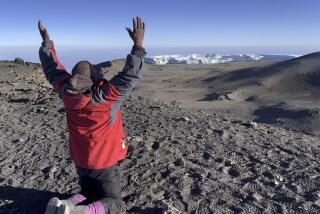Dentist in Africa Sour on Sweets
- Share via
MASAI MARA, Kenya — Here on the untamed plains of the Masai people, where boys hunt lions as a test of bravery and many quarrels are settled with a spear, a 70-year-old American is the champion of sweet talk.
But it isn’t what you might think.
“Tanga enkutuk!” the command--”open wide”--comes in Masai.
Here we go again, Dr. Raymond Damazo announces from behind a pair of thick spectacles in his best I-told-you-so dentist’s voice. Another jaw of cavities so far gone the teeth can’t be saved. And Kiminta Ene Yenkon, as pretty as an African sunset, is barely 6 years old.
“Sweets,” says the little girl, the only English word she knows. “I get candy from the tourists on the road,” she continues in Masai.
Damazo huffs. He knows the sweet story well. It sticks with him like a licked lollipop to its wrapper. A perfect little mouth laid to waste by sucrose, glucose, dextrose and fructose from halfway around the world.
Damazo hates those “oses” on the road.
The bumpy dirt thoroughfare beyond Nkoilale Primary School is a main route to the Masai Mara Game Reserve, one of Kenya’s most popular safari destinations. It has no name and looks harmless, but it might as well be the Road to Hell, Damazo figures. It is paved with countless good intentions, all of them deliciously sugarcoated.
“These tourists with candy think they are being kind to the poor kids of Africa who don’t have anything, but they are doing the worst thing possible in the world,” the dentist says of the game-park visitors, some of whom arrive lugging pounds of the stuff as gifts for the children. “They have no dentists here, no pain medicine, and ultimately the chief is going to rip out the bad teeth with the point of a knife.”
Ouch. Just talking about it brings a pained furrow to the brow of Gail Sage, Damazo’s wife of two months and loyal assistant in bush dentistry. Sage has one of those happy faces that lights up when she looks at you, but get her talking about those “oses” and the Road to Hell, and she becomes just as huffy as her husband.
Sage has seen the shredded gums that come with knife dentistry. The digging and wrenching are so primitive that good teeth often get botched up in the process. A simple toothache becomes an agonizing mouth of horrors. The blood, the infection, the abscesses. . . .
Listening to Sage, there’s no controlling your terrified tongue. It sweeps madly from left molar to right, across the bicuspids, over the incisors and canines, hurriedly taking inventory. It can’t be stopped.
One, two, three, four . . . 18, 19, 20 . . . 30, 31 and 32.
Praise the Lord, sweet 32! A full mouth. But you don’t actually say sweet 32. Not now. Not here.
All because of the “oses” and the Road to Hell.
“We try to do as much education and prevention as possible,” says Sage, 45, who is studying to become a dental hygienist near the couple’s home in suburban Seattle. But it isn’t nearly enough. The sightseers keep coming. The Masai keep going to the Road. And Damazo keeps yanking teeth.
Last year, the couple logged more than 11,000 miles on their custom-built Land Rover, hauling everything from an X-ray machine to dental floss through the remote grasslands of Kenya, Tanzania, Zimbabwe and South Africa. They charge nothing for their services and estimate that they spend $50,000 a year keeping the mobile practice going.
Children Cry Out for Something With Sugar
In 11 years of visiting Africa, the septuagenarian dentist has never seen such awful decay, so many missing teeth and so much gum disease as during his past few visits. On a continent where dental hygiene often amounts to picking one’s teeth with a frayed branch, sugar is a mouth’s worst enemy. When left in an unclean oral cavity, as the dentists like to say, it helps breed 37 kinds of decay-causing bacteria.
“Each passing tourist vehicle is a shop full of sweets,” says Kipkoech Rotich, who runs a medical clinic at the Siana Springs Tented Camp, a nearby safari lodge where Damazo also treats staff members and their families. “These kids don’t have money to buy sweets, but when it comes free from the tourists, they take as much as possible.”
These days, when the “Sweets! Sweets!” chorus commences, Damazo and Sage respond with “Pens! Pens!” You can find them handing out thousands of pens and pencils--their idea of a sugar substitute.
Schools are short on basic supplies, putting pens in great demand. But most foreigners still toss treats that tingle the tongue--so a stern dentist offering ink and graphite gets more looks of exasperation than gratitude.
“Would you rather have these pens or some candy?” Damazo asks a gathering of boys singing “Sweets! Sweets!” when his office-on-wheels comes to a halt at a cattle crossing.
Huh? Is he mad? It isn’t the kind of question you ask in the company of sweet-toothed strangers. But wait. The littlest boy is intrigued by the blue ballpoint. Is he going to make Damazo’s day?
“Sweets! Sweets!” the others shout, pushing the tiny one aside.
In your dreams, Damazo says. This sugar thing of his goes way back. In his 40 years as a dentist, he has never so much as calmed a crying child with a sucker.
Since getting together six years ago, Damazo and Sage have spent their holidays and then some trying to undo the sweet intentions of their fellow Westerners.
The couple fill cavities, remove tartar, pull teeth, build bridges--even perform root canals--on people so unfamiliar with modern dentistry that they are more curious than fearful when they hear the whine of a high-speed drill. Well, the first time anyway.
“I know there seems there must be an angle where I am going to make money, but I have been fortunate in business at home and I am happy to do it,” says Damazo, who retired from dentistry three years ago and now runs a corporate picnic business at his farm in North Bend, Wash.
Let’s be frank. It isn’t always a holiday. Sage has been stung by a scorpion. Their Land Rover has been charged by an elephant. Monkeys have trashed their supplies. They have broken down countless times in the middle of nowhere.
They’ve even had HIV/AIDS scares, the worst one when Sage was pricked with a used Novocain needle three years ago. She gets regular AIDS tests now; the results have been negative.
“I thought I had been given a death sentence,” she says.
But they keep coming back for more.
As word spreads about their arrival, people walk as many as 10 miles for a turn in the folding dentist chair. Some have no shoes. At the end of the day, with the line still growing, they are told to come back another time.
“It doesn’t make sense to say, ‘I can’t do everybody, so why do anybody?’ ” Damazo says.
The couple’s yardstick of Africa’s dental health is a Masai school just outside the eastern entrance to the Masai Mara reserve. They make a point of going to the school every year. They examine 200 or so pupils and track their findings.
The rotten mouths speak for themselves.
In the late 1980s, Damazo would find about four children with cavities or missing teeth caused by decay. A decade later, he counts as many as 60, including ones such as Kiminta, the schoolgirl whose baby teeth are ridden with holes and whose first permanent molars are wasting away as well.
The trend is much the same outside game parks in Tanzania, Zimbabwe and South Africa, the places where the couple do most of their volunteer dentistry. The worst cases he sees, Damazo says, are children of park wardens stationed at the gates. As boss, the wardens get dibs on the “oses.”
Esther Mutwota, who helps run a community education program for Colgate-Palmolive in Kenya, says some dental problems can be blamed on a changing diet and the growing availability of sugar-sweetened soft drinks. Not so long ago, the Masai dined on milk mixed with blood from farm animals. That was it. Now there are grains, vegetables, processed foods and meats, which can become lodged in the teeth and cause decay. Not to mention Coca-Cola.
Also, Mutwota says, the toothbrush is a hard sell. It is widely perceived as something for whites only. Even those blacks who can afford them often don’t use them. She estimates that just half of Kenyans brush their teeth properly.
“The Masai are very careful to clean their teeth with a stick, but what they do is incomplete,” she says.
Most everyone agrees that the most serious problem, at least near the game parks, dresses in khaki, carries a U.S. or European passport and hurls bonbons, bubble gum, jawbreakers, gummy bears, licorice and every other imaginable form of crystalline carbohydrates from the windows of safari vehicles.
The visitors--900,000 in Kenya alone last year--are encouraged to do so by tour operators around the world. Gifts of candy are seen as tokens of kindness toward remote communities. Somehow, sugar is supposed to compensate for being upstaged by lions, elephants, giraffes and zebras.
Damazo has struck a deal with Conservation Corporation Africa that is making it easier for him to undo some of that “kindness.” The South African-based company operates 22 lodges in eastern and southern Africa. It also runs a nonprofit foundation aimed at improving the lives of people surrounding its properties.
Damazo likes the lodges and the company’s do-good philosophy. He gets free room and board in exchange for tending to the dental needs of lodge employees, their families and nearby residents. He then uses the lodges as a base for his other dental work, staying in Africa up to three months at a time.
“I enjoy giving something back, but I don’t think anybody in the whole wide world, except Mother Teresa, has had 100% altruistic motives,” Damazo says. “We put in a good day’s work, but still in the late afternoon we quit so we can have some fun and adventure.”
Damazo likens his dentistry to emptying an ocean with a bucket. But he is nothing short of a folk hero in these parts. He remembers names, always asks about the family and bids farewell with a friendly pat on the back. He maintains the strictest professional standards--changing latex gloves between patients, sterilizing equipment and even providing background music with a portable CD player.
Among today’s offerings: Luciano Pavarotti and Garth Brooks.
Forging a Compromise With Native Customs
A young Masai warrior, Moses Kantet Masoi, arrives and asks that his eyetooth be removed. The baby tooth had never fallen out, so the permanent tooth had nowhere to go. It’s riding high on his gums like a double fang.
He walked most of the morning. There is a Masai superstition that a double fang brings bad luck to the family. His father wants it gone.
“The eyeteeth are the strongest teeth,” Damazo tells the warrior. “Lions have them so they can tear. They hold your mouth together. You’ll look like a chipmunk if I take it out.”
A what? “You’ll look like a buck beaver,” he tries.
Say again? No matter.
“I discussed it with my father yesterday, and the tooth has to be removed,” comes the reply.
Damazo volunteers to pull the baby tooth. The permanent tooth would eventually move into place.
A moving tooth? I don’t buy that one, Masoi says. Neither will my dad.
Fine. Be on your way. . . . Then Damazo has one of those ideas that would sound crazy anywhere but here. He proposes taking out the bottom front teeth, which is a signature of the Masai and would make both Masoi and his father proud. Damazo knows that the two teeth would be dug out someday anyway.
In exchange, Masoi has to forget about messing with the eyetooth.
Deal? Deal.
“I will accommodate tradition when it is not detrimental to the mouth,” Damazo says. “Those are my rules.”
More to Read
Sign up for The Wild
We’ll help you find the best places to hike, bike and run, as well as the perfect silent spots for meditation and yoga.
You may occasionally receive promotional content from the Los Angeles Times.






